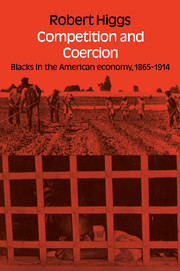Book contents
- Frontmatter
- Contents
- List of tables
- Preface
- “Race” and “racial discrimination”: A prefatory note on usage
- 1 Approaching the facts
- 2 The people
- 3 The people at work, 1865–1880
- 4 The people at work, 1880–1914
- 5 The fruits of their labors
- 6 Overview and interpretation
- Technical appendix
- Notes
- Select bibliography
- Index
- Frontmatter
- Contents
- List of tables
- Preface
- “Race” and “racial discrimination”: A prefatory note on usage
- 1 Approaching the facts
- 2 The people
- 3 The people at work, 1865–1880
- 4 The people at work, 1880–1914
- 5 The fruits of their labors
- 6 Overview and interpretation
- Technical appendix
- Notes
- Select bibliography
- Index
Summary
The title of this book expresses its central theme: economic competition and racial coercion as joint determinants of the material condition of America's blacks during the first half century after their emancipation. Racial coercion has received extensive scholarly attention, but important competitive processes remain largely overlooked. I seek to redress the balance, to show that competitive forces profoundly influenced black economic life, indeed, that competition played an important part in protecting blacks from the racial coercion to which they were peculiarly vulnerable. Lest this be mistaken for economics run rampant I must warn the reader that my interpretation attaches fundamental importance to political and legal forces in the shaping of black economic development: the exclusion of blacks from effective participation in politics and from the equal protection of the law had both direct and indirect effects that retarded their economic progress. To say that their progress was retarded, however, is not to say that no progress occurred. I have devoted considerable attention to documenting and crudely quantifying the substantial economic gains realized by the black population during the half century after 1865.
My objectives are limited, and no one should mistake the present volume for a comprehensive economic history of black Americans in the post-Civil War era. For example, although I discuss the relation between the postbellum credit system of the South and black economic progress, I make no attempt to resolve the many open questions about the business methods of the merchant creditors, the extent of their monopoly power, or their role in the land tenure system of the rural South.
Information
- Type
- Chapter
- Information
- Competition and CoercionBlacks in the American economy 1865-1914, pp. ix - xPublisher: Cambridge University PressPrint publication year: 1977
Accessibility standard: Unknown
Why this information is here
This section outlines the accessibility features of this content - including support for screen readers, full keyboard navigation and high-contrast display options. This may not be relevant for you.Accessibility Information
- 1
- Cited by
